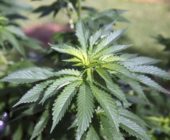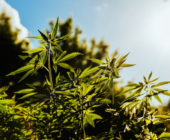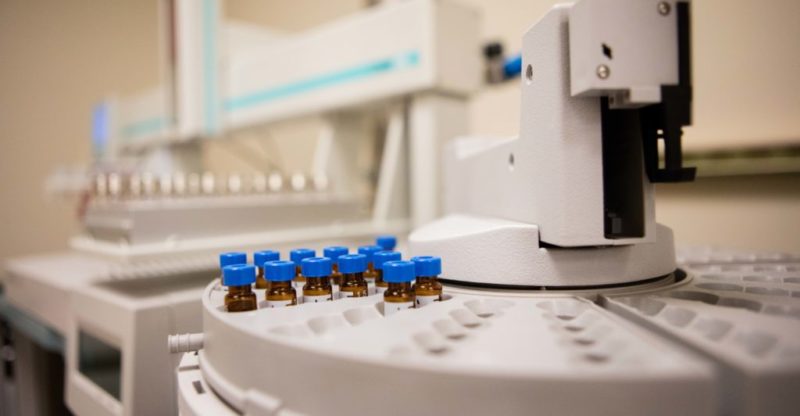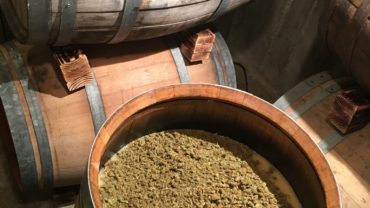
Cannabis samples await testing at a state-certified pot lab in Washington.
Last year, the state of Washington sent auditors to investigate Peak Analytics, a state-certified cannabis testing lab. The auditors found bad lab practices and some eye-opening pot potency results, including one test result where Peak Analytics gave a sample of Blue Dream a 37.2 percent THCa reading.
A sample of pot flower that potent would be extraordinary, possibly even record-breaking, so the auditors asked to see the data behind the results. But when asked, Peak Analytics couldn’t locate any of the data behind that test result.
Peak Analytics was suspended following the audit, at least the third certified lab in the state to be suspended by the Washington Liquor and Cannabis Board. And, troublingly, those suspensions came after the labs in question grew to be the most popular in the state, testing a vast majority of the state’s legal pot. And the state has been slow to investigate, auditing labs only after private individuals repeatedly warned the state for months before the suspensions were delivered.
Legalizing weed and submitting it to modern testing should make it safer, but Washington learned that legal weed isn’t necessarily safe weed if the certified labs aren’t playing by the rules.
Don Land, the chief scientific consultant for Steep Hill Labs, one of the country’s largest cannabis labs, said a combination of loose regulations and slow enforcement created an environment where labs in Washington could cheat the system to get more business and make more money.
“In Washington, there were fairly loose regulations about who could become a lab and what qualifications they needed. That led to a whole bunch of labs that really weren’t qualified and really didn’t have the right attitude about being honest,” Land said. “There was this grab for market share and it went mostly to cheaters, for labs that could game the system.”
In a 2016 audit of Testing Technologies, another lab certified by the state, auditors wrote that the state-certified lab had “blatant disregard for good laboratory practices as well as sound scientific methods,” and that there was an “extremely real” possibility that unsafe pot that should have failed testing had made it to the legal market. Testing Technologies was subsequently suspended.
Jim MacRae, a data scientist in Washington that has been one of the leading watchdogs of the state’s cannabis labs and has been regularly quoted in Seattle area newspapers, including The Seattle Times, said it would be a shame if California repeated Washington’s mistakes.
“I’m of the impression that the [Washington] Liquor and Cannabis Board was grossly negligent in their responsibilities and they did so at the expense of public health and the ultimate viability of this market, and it would be a shame if it happened in California,” MacRae said.
Brad Douglass, a science director with The Werc Shop cannabis lab, said California has a promising start on regulating cannabis labs, but much will hinge on how the regulations are enforced.
“It looks like California has done a good survey of existing states including Washington and put that into their lab regulations,” Douglass said. “Now that they have those regulations in place the question is going to be is that enforced on labs in California.”
Washington has found that ensuring legal pot is safe pot is not as simple as it sounds, so what can the Golden State learn from Washington’s pot lab troubles?
Regulations and Enforcement
A regulated pot market brings with it plenty of benefits. It helps reduce the detrimental environmental effects of black market growers, it allows the government to tax the cannabis industry and, maybe most importantly, it gives customers a way to know that their pot is safe.
But ensuring the safety of legal weed puts state-legal markets in an unusual position. Most product safety is directed by the federal government. The aspirin or milk you buy in the store is safe largely because the federal government has written rules and recommendations for how product safety testing should be conducted. For cannabis, which is still highly illegal at the federal level, there are no directives for how to test for things like mold or pesticides.
That left state regulators in Colorado and Washington, the first governments in the world to fully legalize and regulate pot, the job of writing the rules for pot safety. Washington’s first mistake, according to Land, was creating their own set of regulations for how labs could become certified, rather than using lab regulations crafted by the International Organization for Standardization (ISO).
“In every other industry that has testing as a requirement, ISO, an international standard for laboratories, is used,” Land said. “I don’t quite understand why you would go with anything else, frankly.”
Washington’s own set of lab standards created a lower threshold for labs, and allowed labs that were little more than “basement operations” to enter the market, according to Land. Unlike Washington, California has required all labs to acquire ISO certification. The state has also put a higher threshold on labs by requiring all products to be tested for pesticides.
Land said raising the bar will make the pot labs in California more capable.
“If you raise the bar you are going to eliminate some of the fly-by-night operations, but you’re going to have very capable certified labs.” Don
But a higher standard to acquire a license is only the start. Cannabis labs have an economic incentive to cheat, given both the labs and their pot-producing customers are for-profit business. The labs want more business from cannabis companies, and the cannabis companies want to see fewer samples rejected and higher THC results. If the labs aren’t continuously monitored they can start to game the system and return better results for their customers.
That’s what happened in Washington, according to MacRae.
“What came about pretty quickly was a strong bias towards people going to the lab that was giving systemically higher results for potency testing and the bottom line is, in Washington’s market, it paid off,” MacRae said.
For both Testing Technologies and Peak Analytics, suspensions were delivered only after they had become the busiest labs in the state, according to MacRae’s analysis. They were also delivering test results that were remarkably favorable to pot producers. The state’s auditors found that Peak Analytics was failing only 1.69 percent of samples for microbial contamination, while the market average for failure from the state’s other labs was 11 percent. Testing Technologies failed less than one tenth of a percent of samples it tested, according to the lab’s 2016 audit.
How can California stop its certified cannabis labs from engaging in this kind of behavior? By policing the system and issuing severe penalties for labs that break the rules, according to Land.
“Labs that cheat need to lose their license or be fined or have significant penalties that mean something,” Land said. “You can garner a lot of market share and make a lot of money if the only thing that comes along if you cheat to do that is a little fine or somebody calling you and saying don’t do that.”
That’s the approach the state of Nevada has taken, suspending four of the state’s nine labs within the first five months of the state’s legal market.
The state has a number of enforcement tools to keep tabs on labs. Secret shoppers can purchase retail cannabis and then have those samples retested, to see if the original lab correctly tested the product. Regular sample testing between labs can be used to make sure each lab is able to correctly identify contaminants and measure potency. And simply watching the aggregate data that the labs report can show troublesome patterns.
That’s how MacRae, a private citizen, was able to notice the problem labs in Washington. The state’s cannabis data is all considered public record, so MacRae filed a public records request and analyzed the massive sets of data being produced by each lab.
MacRae said California’s regulators should be paying close attention to each lab’s results.
“If the regulatory authority in California does not police what the labs are reporting it is going to go to hell in a handbasket just like it did in Washington, just like it seems to be doing in Alaska and Oregon,” MacRae said. “The bottom line is what we saw in Washington is not unique to Washington. I’ve been contacted by people in Oregon and Alaska right now that are seeing exactly the same thing.”
Will the Golden State hold its cannabis labs accountable and ensure that legal weed is safe weed? Douglass said was somewhat optimistic, but much remains to be seen.
“I would say that I am optimistic, and I would say that California has learned from some early adopters like Washington, that said I think there are still holes that can be exploited if there’s not strong enforcement.”
Lester Black is a freelance journalist based in Seattle, Washington. He is The Stranger’s cannabis columnist and his work has appeared in a range of publications, including Popular Mechanics, The Albuquerque Journal, The Tennessean, and Seattle Weekly. Find him on Twitter @leddder.








